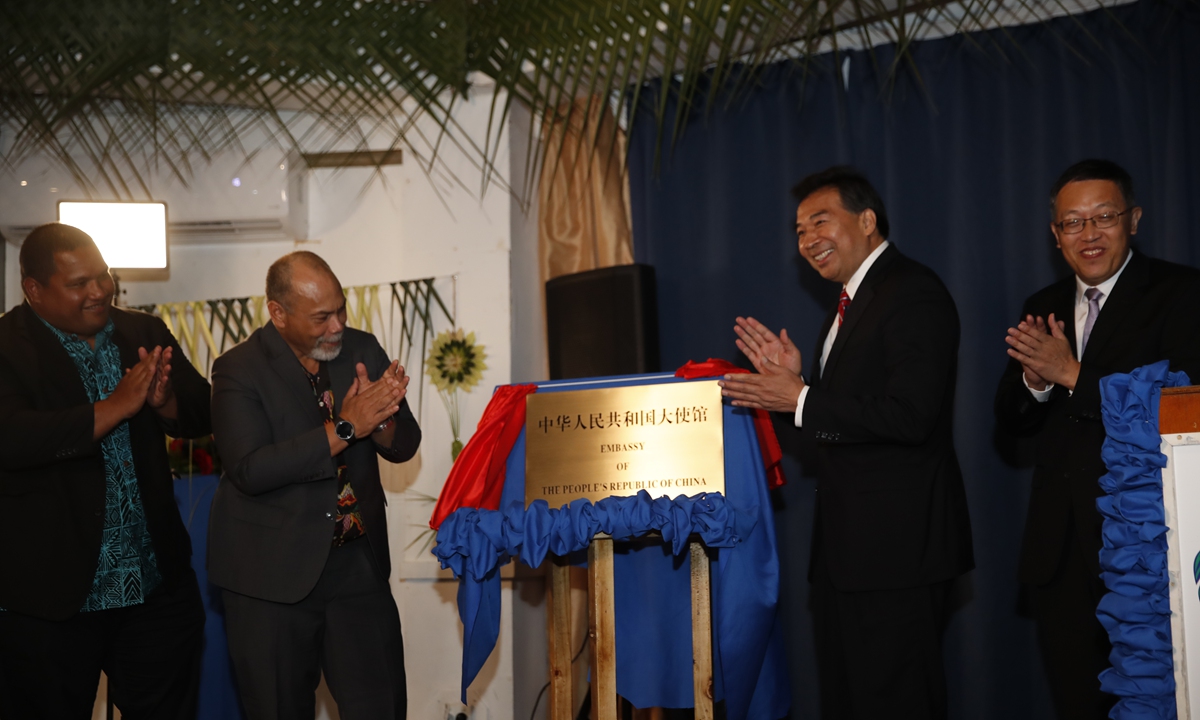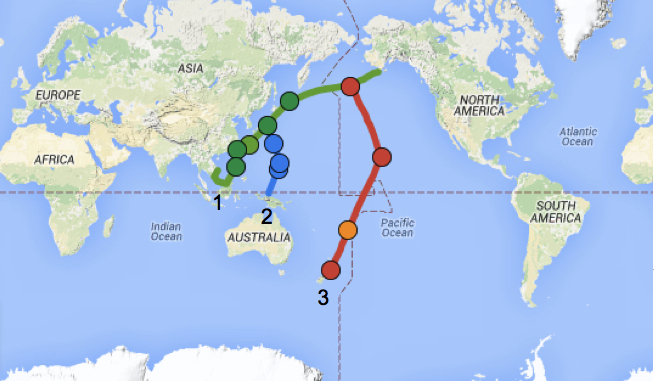Nauru’s diplomatic switch to China is a setback for US imperialism
Written by: (Contributed) on 30 January 2024
Above; Chinese Embassy opening, Nauru, January 2024 Photo Xinhua
A brief, short diplomatic statement from the government of Nauru, that it had decided to switch diplomatic allegiance from Taiwan to China, was largely overlooked by western media outlets. It was not expected and obscured by the Taiwanese general elections only two days earlier. The timing of the diplomatic switch together with the terse nature of the statement, however, would tend to reveal a major diplomatic stand-off has taken place; it has, furthermore, been a major setback for US-led regional foreign policy.
On 13 January the people of Taiwan returned a Democratic Progressive Party (DPP) government for a third term of office with president-elect Lai Ching-te. It is, however, a minority government with 51 MPs as opposed to the Kuomingtang (KMT) with 52 seats. The small Taiwan Peoples Party (TPP) had eight MPs elected, ensuring that it holds the balance of power. The election results, nevertheless, were given high-profile through US-led media outlets, stressing the 'democratic' nature of Taiwan's political system.
Quite unexpectedly, only two days later, the government of Nauru announced it was switching diplomatic allegiance immediately from Taiwan to China. The diplomatic statement included that Nauru would 'no longer recognise Taiwan as a separate country but rather as an inalienable part of China's territory …. and ... Nauru said it would sever diplomatic relations with Taiwan immediately and no longer develop any official relations or official exchanges with Taiwan'. (1)
No official explanation was provided about the diplomatic switch although a statement from Taiwanese deputy foreign minister, Tien Chung-kwang, said 'the government was ending diplomatic relations with Nauru to safeguard our national dignity'. (2) It was accompanied with an official statement from the Biden administration in the White House, that 'criticised the micro-state's distorted rationale'. (3)
Political intrigue inside the corridors of power in Nauru would appear to have taken place in secret. Following the elections in Taiwan on Saturday, Nauru was the first country to congratulate Taipei on the success of the elections the following day, while on Monday morning the diplomatic switch took place! (4) The timing was also particularly embarrassing for the Biden administration which had sent a senior US delegation to Taipei including former national security adviser Stephen Hadley, to assist president-elect Lai for what has been regarded as a 'tense five-month period before his inauguration'. (5)
The US is quite clearly concerned about Taiwan: last October, for example, Nauru president Russ Joseph Kun was given what was regarded as a hero’s welcome in high-level diplomacy with Taiwan; on returning home he was ousted with a no-confidence vote led by David Adeang who was responsible for the sudden announcement about the diplomatic switch to China. (6)
The diplomatic switch has been a further addition to the failed DPP New Southbound foreign policy which is now left in tatters; attempts to foster stronger diplomatic ties across the Indo-Pacific region have seriously backfired. Nauru is the tenth country which has cut diplomatic ties with Taiwan since the DPP took office in 2016, with President Tsai Ing-wen. Taiwan now only has official diplomatic links with twelve countries, none of which are major players in global diplomacy. A recent statement from a former senior Taiwanese foreign ministry figure, likewise, has also caused concern by suggesting 'another one or two of Taiwan's allies … could … be poached by China in coming months'. (7) More to come?
While it is difficult to generalise about China's ability to marginalise Taiwanese diplomacy research conducted by AidData, based at the William and Mary University in the US, has established Chinese diplomacy remains strongly based in economic and financial criteria; Beijing is not reluctant to offer developing countries meaningful aid packages in return for mutually beneficial diplomatic ties. China's aid packages in the Pacific region have been particularly generous over the past two decades. (8)
It has been strongly speculated that Nauru's diplomatic switch away from Taiwan to China was caused by the Australian government winding down aid packages for its off-shore asylum-seeker facilities on the islands causing a shortfall with their budget. (9)
While Taiwanese officials have been invited to regional dialogues and forums, China has effectively forced them out, emphasising the One China policy. (10) Taiwan, nevertheless, maintains 112 representative missions in over seventy countries; in less than sixty years it has been transformed from a rural backwater to a highly developed economy and part of global supply chains for semi-conductors. (11) Its diplomatic future now, however, is beginning to look increasingly vulnerable and precarious, with dwindling diplomatic recognition.
The developments have been particularly problematic for the US; it is not difficult to track US-led regional miitary and security concerns and their inability to maintain traditional hegemonic positions in the face of competition from a strongly assertive China. The Nauru diplomatic switch is all the more acute for the US due to local politician, Barron Waqa, soon to become the next secretary-general of the highly influential Pacific Islands Forum. China, potentially, will be able to use its newly established diplomatic links with Nauru to present a favourable image to a wider regional audience. (12)
Taiwan is a component part of the US-led Indo-Pacific Strategy and its diplomatic links are also used for intelligence-gathering. The increasing diplomatic isolation of Taiwan, therefore, rebounds strongly inside the Pentagon and also the 'Quad', used to contain and encircle China. (13) Countries switching diplomatic allegiance from Taiwan to China are regarded as problematic: Nauru, for example, has a relatively central position in the Pacific, the arc to US military facilities based in Guam also swings through sensitive Australian military signals facilities based in Queensland. (14)
Secondly, Taiwan is the vital component part at the head of US-led Island Chain Theory (above); small Pacific countries, such as Nauru, have huge strategic significance for access and egress across the wider region.
Demands, from inside the ruling DPP presidential administration for eventual full independence, have a huge significance for the US and its allies, including Australia!
1. Nauru switches diplomatic ties from Taipei to Beijing, Australian, 16 January 2024.
2. Ibid.
3. US says Nauru switching ties from Taiwan to China 'disappointing', The New India Express, 16 January 2024.
4. China advances into Indo-Pacific, Editorial, Australian, 17 January 2024.
5. Beijing warns of 'harsh punishment', Australian, 16 January 2024.
6. Editorial, Australian, op.cit., 17 January 2024.
7. Beijing 'buying up' allies in Pacific, The Weekend Australian, 20-21 January 2024.
8. China's billions make new allies, Australian, 8 November 2023.
9. Editorial, Australian, op.cit., 17 January 2024.
10. See: Beijing keeps a wary eye on new US Taipei outpost, Australian, 18 June 2018.
11. See: Democratic Taiwan proud to stand with regional partners, Editorial, Australian, 15 January 2024.
12. Nauru gave Australia advanced warning of decision, SBS., 16 January 2024.
13. See: The reasons behind Washington's push for GSOMIA., Hankyoreh, 12 November 2019.
14. See: Peters Projection, World Map, Actual Size.
Print Version - new window Email article
-----
Go back
Independence from Imperialism
People's Rights & Liberties
Community and Environment
Marxism Today
International
Articles
| Communist Party of the Philippines: Persist in armed struggle, frustrate US war plans |
| Israel gets a taste of its own medicine |
| CPI (Maoist) announces the immortalization of 50 people's fighters |
| Adelaide People Gather Round For Palestinians |
| Haiti: for thousands of new Louvetures |
| Philippines Constitutional change: lingering spirits and the ghosts of the past |
| North American Indigenous people support Palestinians |
| The return of the Philippines puppet Mark 2 |
| International Women's Day and Palestinians' Struggle |
| Tuvalu’s Taiwan ties remain, but seeks to regain sovereignty from Australian security pact |
| Indonesia: Shadowy hands, shady dealings |
| Condemn the Israeli bloodlust! |
| US imperialism has no friends, only ‘interests’ |
| Aaron Bushnell – rest in power… |
| Greetings to DFLP on its 55th anniversary |
| The Solomon Islands and the 'Look North' policy. |
| Iran, Iraq and the isolation of US imperialism in the Middle East |
| Hobsons Bay community rally for Palestine |
| Nauru’s diplomatic switch to China is a setback for US imperialism |
| Reverse the decision to suspend funding to UNWRA |
-----


